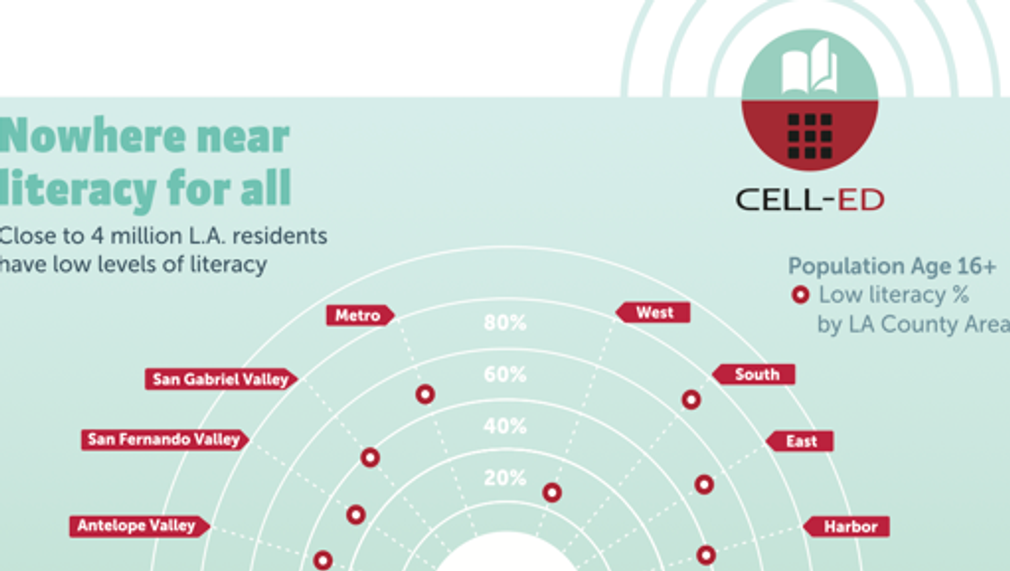Dial for English on the Go
Cell-Ed aims to narrow educational divides in LA County by offering over 1000 households with low literacy levels 24/7 mobile learning access to English language and life skills. Dialing a Cell-Ed number from any mobile phone, these parents and their school-age children will be able reach and complete award-winning Cell-Ed’s literacy and language programs in the palms of their hands.

In what areas of Los Angeles will you be directly working?
County of Los Angeles
City of Los Angeles
How do you plan to use these resources to make change?
Conduct research
Engage residents and stakeholders
Expand a pilot or a program
Incorporate feedback from households to improve program, scale
How will your proposal improve the following LEARN metrics?
Percentage of children enrolled in early education programs
Youth unemployment and underemployment
District-wide graduation rates
HS student proficiency in English & Language Arts and Math
Student education pipeline (an integrated network of pre-schools, K-12 institutions, and higher education systems that prepares students for seamless transitions between high school, higher ed
Suspension and expulsion rates (Dream Metric)
Truancy rates in elementary and middle schools (Dream Metric)
Describe in greater detail how you will make LA the best place to LEARN.
“To study all I needed to do was call and I’d be studying within one second- and anytime! I liked the conversations and tips to help me understand and pronounce English,” Briseida, who achieved 97% proficiency using Cell-Ed
Imagine the challenge of reading a note your child brings home from school or taking high-school tests in math and reading or applying for a job when you simply cannot understand the material you are reading. This literacy problem impacts over 3.8M Angelenos who lack the skills to navigate school, daily life, and today’s labor market. The majority are members of Spanish-speaking households with low levels of literacy.
Low literacy skills are directly linked to higher unemployment rates, lower incomes, and poor health that impact the entire household. In fact, a child who does not read proficiently by the 3rd grade is four times more likely to leave high school without a diploma.
To meet the promise of LA2050, Cell-Ed aims to raise household literacy levels for hundreds of low literate Spanish-speaking parents and their children in Los Angeles County. Parents with higher literacy and educational skills tend to value education of their children, utilize early education services more, and encourage their children to stay in school and reach higher levels of education. In this way, Cell-Ed can impact multiple ‘’LA2050 Learn” metrics over time by increasing two generation family literacy skills.
Not only was Cell-Ed born, piloted and proven effective in Los Angeles County, we have partner networks ready to offer Cell-Ed to these households for free, including social service organizations and labor unions.
Dialing a Cell-Ed number from any mobile phone, parents and their school-age children can reach award-winning Cell-Ed’s literacy and language programs – Learn to Read and English on the Go Levels 1–4 – and achieve English proficiency in the palms of their hands.
By improving the education and skills of these households, together we can help to reverse the trend in falling wages of low-earning workers, reduce income inequality, lower wage gaps, reduce poverty, and improve child well being. Addressing this gap would certainly make LA an even better place to learn for all Angelenos.
Sources: US Census, First5LA, La Workforce Literacy Project, Cell-Ed
Please explain how you will evaluate your work.
Cell-Ed has a two-part monitoring and evaluation approach. For all of our partners, we:
1) Evaluate Learning Outcomes: We expect that learners will demonstrate increased literacy after completing the Cell-ED program and provide pre- and post-test assessments.
2) Monitor Learners’ Experiences with Cell-ED: It is important to monitor learners’ experiences with Cell-Ed and be responsive to their needs. Fortunately, the platform includes a learner management system that automatically captures important data points. Key Performance Indicators include:
• Average error per module
• Time to completion
• Number of coach interventions per learner
• Logging when learners access Cell-ED
3) In addition, each learner is tracked by a Cell-Ed live learning coach who gets feedback via live calls and two way texting and who tracks progress for each learner, including attainment and well being assessments.
How can the LA2050 community and other stakeholders help your proposal succeed
Money (financial capital)
Publicity/awareness (social capital)
Community outreach
Network/relationship support